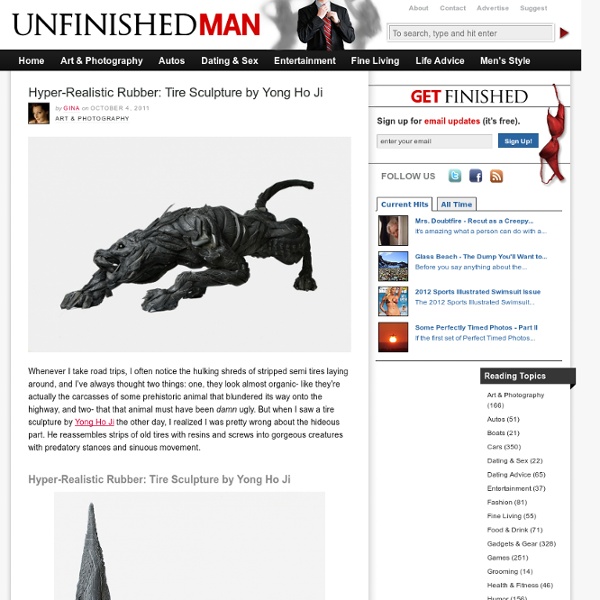hearty magazine | Katsuyo Aoki: Porcelain skulls
Katsuyo Aoki’s porcelain skulls make death a beautiful thing With Halloween on its way and so much death imagery everywhere, it’s refreshing to see Katsuyo Aoki’s take on ghoulishness. Her porcelain skull sculptures feature meticulous vanilla white curly patterned details, that look like they could be made of coral–or maybe icing. (Mmm?) And if you look closely, you can almost make out blissful grins. Bringing light to darkness, Katsuyo Aoki’s skulls reminds us that life (and death) is beautiful. See more of Katsuyo Aoki’s skulls below.
Lorenzo Duran - Designaside.com - StumbleUpon
L’artista spagnolo Lorenzo Duran si avvale delle foglie come tela per le sue incisioni. Dopo il lavaggio e l’essiccazione, rimuove con precisione chirurgica ed estrema cura i segmenti in eccesso, usando una tecnica simile a quella del tradizionale paper cutting. Quest’ultimo passo è ovviamente il più difficile vista la fragilità del materiale scelto, il risultatò di questo processo è una serie di affascinanti disegni geometrici incredibilmente belli e dilicati. Grazie a Francesca per il suggerimento. via: illusion.scene360.com
The Levitron Revolution: Magical Floating Device - Unfinished Man - StumbleUpon
The Levitron Revolution is one of the sweetest gadgets to have around the house or office. The device features EZ Float Technology which allows you to float pretty much any object you can think of mid-air as long as it weighs no more than 12 ounces. You can even slowly rotate the object in the air with this cool device. The Levitron Revolution comes with a small magnetic disc which is where you place an object weighing up to 12 ounces on so that it may float in the air. Getting an object to float is actually pretty simple. First, place the magnetic disc on the Levitron and wait for the four LED lights on the base station to light up. This sophisticated system is constantly adjusting the strength of magnetism to compensate for changes in weight which prevents the magnetic disc from falling. The Levitron Revolution in action! Posted on November 21, 2011 Got something to say? Comment Rules: Keep it civil, and please do not use your site URL in either your name or the comment text.
Pencil Tip Micro Sculptures
Pencil Tip Micro Sculptures Dalton Ghetti creates awesomely stunning miniature sculptures on pencil tips! Mind blown! (Unfortunately I couldn’t find his official website.) 11th of August 2010 Probably Related Paper Sculptures Pencil Carving Photorealistic Pencil Art by Paul Lung Nathan Ota Travel Status Back home since 54 days Currently in: Switzerland Oh dear, do you realise how old your browser is?
Amazing Exotic Gourd Lamps from Calabarte
Creative ways to light up a room with amazing exotic gourd Lamps by Calabarte. Each gourd lamp is made from a gourd brought from Senegal and their exotic design is achieved after carefully selecting dried shells of gourd fruit and drilling patterns into them. Different patterns are designed by carving deeper or shallower into layers of wood. The fruit of the annual tropical vine originating in Africa and Asia are transformed into exceptional table lamps by careful drilling and framing. View the website
The Amazing Crayon Art Of Christian Faur
Christian Faur is an artist based in Granville, Ohio. Looking for a new technique, he experimented with painting with wax, but he didn't feel the results were satisfactory. Then, at Christmas in 2005, his young daughter opened a box of 120 Crayola crayons he'd bought her, and everything clicked into place. Faur decided he would create pictures out of the crayons themselves, packing thousands of them together so they become like the colored pixels on a TV screen. He starts each work by scanning a photo into a computer and breaking the image down into colored blocks He then draws a grid that shows him exactly where to place each crayon The finished artworks are packed tightly into wooden frames. Source
Wire Sculpture | Fubiz™ - StumbleUpon
Coup de coeur pour les étonnants travaux de l’artiste Gavin Worth avec ces différentes sculptures en fil de fer. Actuellement basé à San Francisco, il conçoit à partir de 2 mètres de fil des oeuvres et des profils de personnages. A découvrir sur son portfolio et dans la suite de l’article.
Camera system makes 3D models of anything placed inside of it
The OrcaM Orbital Camera System can create a 3D digital model of any object placed within its 'reconstruction sphere' Image Gallery (3 images) Obtaining a high-quality 3D digital model of a physical object can be a fiddly process, that often requires considerable user input. German research and development company NEK, however, is attempting to make things easier, with its OrcaM Orbital Camera System. Users just place an object inside of its "reconstruction sphere," then the system goes to work, automatically creating a near-perfect three-dimensional recreation of the object. Presently, OrcaM is limited to objects with a diameter no larger than 80 centimeters (31.5 in), and weighing no more than 100 kilograms (220.5 lbs). The process begins with the user sliding back the camera head, opening up the sphere, and placing their object inside. Once the scanning is completed, a linked computer creates a 3D model of the object, using the captured images. Source: Dvice About the Author



